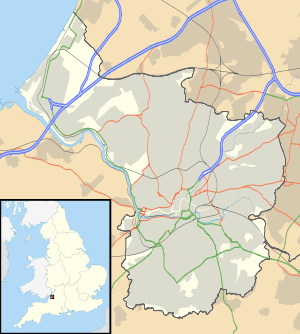Tobacco Factory
| Tobacco Factory | |
|---|---|
 The Tobacco Factory during cleaning work which saw a Union Jack flag covering scaffolding | |
 Location within Bristol | |
| General information | |
| Architectural style | Industrial |
| Town or city | Bristol |
| Country | England |
| Coordinates | 51°26′32″N 2°36′49″W / 51.4423°N 2.6135°W |
| Client | W. D. & H. O. Wills |
| Technical details | |
| Structural system | Brick and Iron |
The Tobacco Factory is the last remaining part of the old W. D. & H. O. Wills tobacco factory site on Raleigh Road, Southville, Bristol. It was saved from demolition by the architect and former mayor of the city George Ferguson and through his vision has become a model of urban regeneration. It is now a multi-use building which houses Thali Cafe,[1] animation and performing arts school, loft-style apartments, a café bar, offices and a theatre.
Inspired by the Manchester Independents campaign, George Ferguson decided to launch a Bristol-based campaign from the Tobacco Factory, the purpose is to encourage the support and patronage of independent outlets and businesses to help redress the balance that has swung strongly in favour of the multiples at the expense of local character and enterprise. Business at the Tobacco Factory epitomises this, with home grown enterprises, such as Fanatic Design,[2] CLIK, and The Thali Cafe.[3]
The motto worn on the shirts of the bar staff is "Strike a light for Independents!"
History
The factory was built between 1898 and 1901[4] as 'Number 3 Factory' for W.D. & H.O. Wills. The building was used to process tobacco until 1985-6 when Imperial Tobacco, which W.D & H.O. Wills had latterly been a part of, relocated production. The building fell into disrepair until 10 September 1993, when George Ferguson bought the building with the plan to regenerate it as a creative, mixed-use community building.[5]
Tobacco Factory Theatre
Since the creation of the theatre space on the first floor in 1998, companies including Show of Strength Theatre Company, Shakespeare at the Tobacco Factory, the Royal National Theatre and The Ministry of Entertainment have performed there as well as regular in house productions.[6] The theatre is now recognised by Bristol City Council as a key arts provider.[7] The theatre gained funding from the Arts Council of England for the first time in 2007.[8] The current director of the theatre is Ali Robertson.[9]
The Café Bar
The Tobacco Factory Café Bar opened in November 2001, serving Mediterranean style food in a post-industrial setting. Regular music nights complement the theatre upstairs.[10]
Archives
Extensive records of W.D. & H.O. Wills, who originally developed the site as a factory for processing tobacco, are held at Bristol Archives (Ref. 38169) (online catalogue).
Notes
- ↑ "Thali Cafe replaces Teoh's restaurant at Tobacco Factory". Retrieved 8 June 2016.
- ↑ http://www.fanaticdesign.co.uk
- ↑ "Tobacco Factory building, about us". tobaccofactory.com. Retrieved 2009-03-21.
- ↑ J Wright & Co's Matthew's Bristol Directory, 1898 & 1901
- ↑ "Tobacco Factory timeline webpage". Retrieved 7 June 2016.
- ↑ "Tobacco Factory Theatre". uk.stagejobspro.com. Retrieved 2009-03-21.
- ↑ "Tobacco Factory Theatre". theatrebristol.net. Retrieved 2009-03-21.
- ↑ Baluch, Lalayn (3 July 2007). "Cash boost for Bristol's Tobacco Factory". The Stage. Retrieved 2009-03-21.
- ↑ "Our Staff". tobaccofactorytheatre.com. Retrieved 2010-12-29.
- ↑ "The Tobacco Factory". eatout.co.uk. Retrieved 2009-03-21.